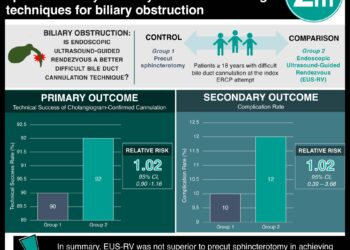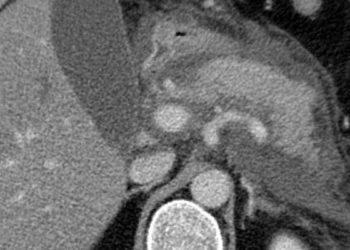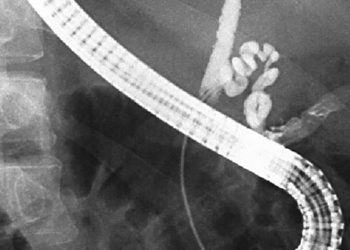Somatostatin may not reduce risk of pancreatitis post endoscopic retrograde cholangiopancreatography
1. There was no significant reduction in the incidence of pancreatitis following endoscopic retrograde cholangiopancreatography with administration of somatostatin compared to placebo controls.
Evidence Rating Level: 1 (Excellent)
Study Rundown: Acute pancreatitis is a significant and potentially fatal complication of endoscopic retrograde cholangiopancreatography (ERCP). Recent studies have elucidated a physiologic role for somatostatin in reducing the incidence of pancreatitis and several meta-analyses have also provided clinical evidence to the same effect. However, given the small sample sizes and variation in drug delivery and dosage across previous studies, much contention still remains regarding its clinical benefit. The lack of difference in the incidence of pancreatitis observed in this study disputes the clinical utility of prophylactic somatostatin administration in preventing pancreatitis following ERCP. Further, no significant difference was identified when comparing the frequencies of mild, moderate, or severe pancreatitis between the somatostatin and control groups. Stratification by high risk and low risk of developing pancreatitis also did not yield any significant differences between both groups. The authors employed a strong study design utilizing a randomized, double-blinded, placebo-controlled trial to readily isolate the effect of the drug on rates of pancreatitis post ERCP. However, despite the discord regarding the therapeutic dose of clinically effective somatostatin prophylaxis, the authors did not vary the administration and dosage of the drug in the study group, and, thus, could not discount an insufficient dosage as a causative factor for the lack of observed difference. Additionally, while the results of the study provide no support for the use of prophylactic somatostatin in all patients undergoing ERCP, it does not rule out the benefit of its administration in patients with specific risk factors for acute pancreatitis, such as Sphincter of Oddi dsyfunction.
Click to read the study in Endoscopy
Relevant Reading: Meta-analysis: somatostatin or its long-acting analogue, octreotide, for prophylaxis against post-ERCP pancreatitis
In-Depth [randomized controlled trial]: A total of 510 patients undergoing ERCP at a single center were included in the study. 255 were randomized to each group. The somatostatin cohort received an intravenous bolus of somatostatin followed by a 4 hour continuous infusion of the drug while the placebo group were administered an analogous dose of saline. Patients undergoing surgeries performed on an outpatient basis were monitored in the hospital for 6 hours post ERCP and were discharged if no symptoms were noted. Further testing was done if a complication was suspected in that time. The overall complication rate was 14.3%. 7.5% of patients receiving somatostatin developed acute pancreatitis, compared to 6.7% of placebo patients (RR 1.12; 95%CI 0.59-2.1, p=0.73). When considering only higher risk patients, rates of developing acute pancreatitis were not significantly different between somatostatin (8.2%) and placebo (9%) groups (RR 0.91; 95%CI 0.38-2.2). No complications or adverse effects to somatostatin, itself, were noted.
More from this author: Meniscal allograft transplantation may improve knee function, Intraoperative PEEP levels may not affect post-operative pulmonary complications, Lower rates of repeat intervention following ureteroscopy for kidney stones
Image: CC/Wiki
©2012-2014 2minutemedicine.com. All rights reserved. No works may be reproduced without expressed written consent from 2minutemedicine.com. Disclaimer: We present factual information directly from peer reviewed medical journals. No post should be construed as medical advice and is not intended as such by the authors, editors, staff or by 2minutemedicine.com. PLEASE SEE A HEALTHCARE PROVIDER IN YOUR AREA IF YOU SEEK MEDICAL ADVICE OF ANY SORT.




![The ABCD2 score: Risk of stroke after Transient Ischemic Attack (TIA) [Classics Series]](https://www.2minutemedicine.com/wp-content/uploads/2013/05/web-cover-classics-with-logo-medicine-BW-small-jpg-350x250.jpg)


